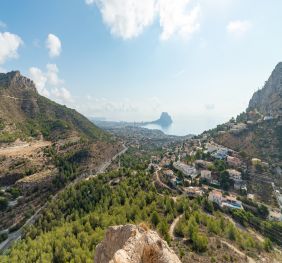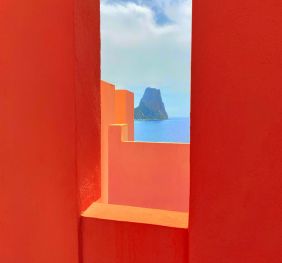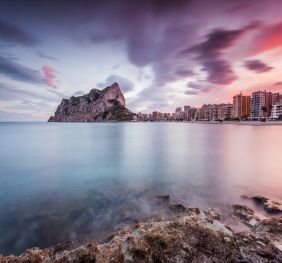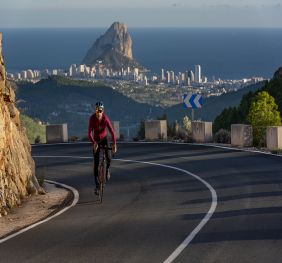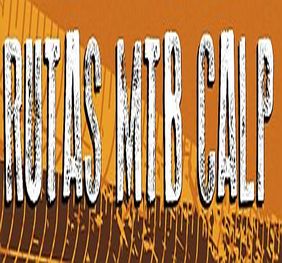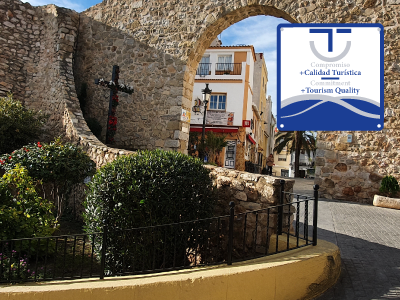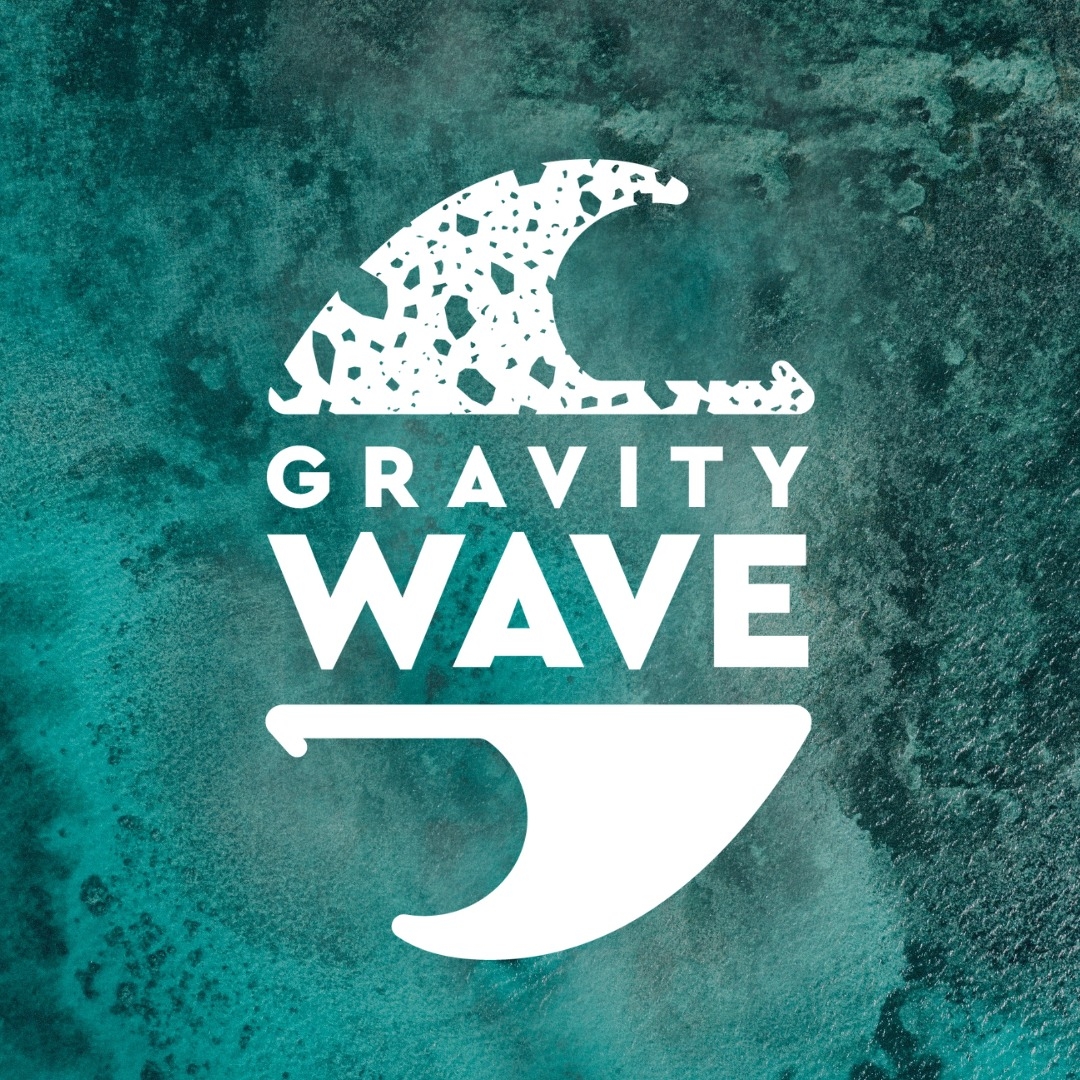ACCESSIBLE CALPE
The two main beaches, the Arenal-Bol beach and the La Fossa beach, have an accessible beach resort. In both cases we have a shade area, chairs and amphibious mulets, fully adapted bathrooms where to shower, bathtubs and supervised bathroom service.
The submarine trail of the UCV is the first adapted to the coastline of the Valencian Community. The route was made possible seven years ago thanks to researchers from IMEDMAR in collaboration with the City of Calp, the Foundation for the Environment of the Valencian Community and Saplaya Consultores. It is a reference for education and protection of the marine environment, is aimed at people of all ages, is free and is installed every year in the summer season.
Calp is undoubtedly one of the most beautiful locations on the Alicantine Costa Blanca in the Marina Alta region.
Its sign of identity is the Ifach Peñón, a unique Natural Park that divides the bay, a huge rock over the sea, halfway between an island and a mountain with a spectacular path that climbs to its summit.
In the Miradores de Levante of the Park itself you can also enjoy impressive views of Calp.
An ideal destination to relax for a few days combining sun and beach tourism with a wide variety of natural environments in a village that stillins the taste and traditions of a seafaring village.
Another of the must-see places that can be visited in Calp, is the Salinas route, an ancient salt lagoon in which you can see different types of birds, especially flamenco, at any time of the day.
It is also essential to make a pleasant walk between the sea and the Peñón de Ifach by the ecological trail Princess of Asturias along 1 km at the foot of the Natural Park.
In addition, every day around 5 p.m. the traditional auction of fish is held in the Lonja building, in the Fishing Port, a visit that can be completed a little earlier with the contemplation of the arrival of the fishing boats to the Port, after they have finished their daily day.
14 beaches and coves where you can choose from kilometre-long beaches of fine and golden sand, quiet bays, small sand coves or virgin coasts of rocks with cliffs.
Also, Playa Arenal-Bol and Playa de la Fossa have accessible points for people with accessibility needs, equipped with socorrism, monitors, dressing rooms, toilets, showers and material such as chairs and amphibious mules. In the summer there is also an underwater trail, unique in the Valencian Community, in the Cala del Racó, where it is possible to practice snorkel adapted with amphibious camels.
The trail of ancient civilizations is present in the Iberian sites, the Thermas and Baths of the Queen of Roman times, ancient fish farming with more than 2,000 years of age, or the Molí de Morelló, flour wind mill characteristic of the Marina Alta region, of the middle of the 19th century. Both can be contemplated while enjoying a pleasant walk connecting the beaches of Arenal – Bol and the Cantal Roig.
It is possible to tour the city in its tourist train and to know its historic centre where you will find emblematic places such as the Torreó de la Peça, the old wall of the 14th century, the different wall paintings, the ancient church in the Gothic-Mudéjar style, the Plaça dels Mariners or the more than famous Puchalt Street with its stairs decorated with the Spanish flag.
SUSTAINABLE CALPE
Calp is a Smart City, from The City of Calp, through the Departments of Tourism and Informatics, has been promoting the Intelligent Tourist Destination (DTI) Director Plan for this municipality since 2015. There is a research project on Intelligent Tourist Destinations (DTI) led by the University of Alicante (UA), from which the city of Calp has been selected as a “pilot destination” to carry out its progressive implementation.
With the Calp DTI Plan a new stage in the evolution of the tourist destination is planned that requires a change in all the areas, actors and actions that influence tourist activity, in order to guarantee the future of the same.
For this reason, Calp is a member of both the DTI Network of the Valencian Community and the National Network of SEGITTUR.
This project aims to promote and consolidate a tourism management framework consistent with the DTI strategy and model.
In addition, Calp has carried out since 2007 various processes of citizen participation, such as the implementation of Agenda 21 Local (the project is open and in progressive development through different forms, means and channels). The City of Calp currently has a Smart City owned council.
The privileged environment of Calp and its natural resources offer the possibility of enjoying an infinity of options for hiking and trekking.
There is also a wide variety of cycling routes:
The excellent conditions of the municipality have made Calp, for years, the preferred destination chosen by most professional cycling teams for their winter training, among them: Movistar Team, Trek Segafredo, Team Ineos Grenadiers (formerly Team Sky), Astana Qazaqstan Team, Jumbo-Visma, Soudal-Quick Step, Cofidis, UAE Team Emirates, Gropama FDJ-Française des Jeux, AGR2 Citroen Team, and Bora-Hansgrohe.
It is worth mentioning that the Tourism Council of Calp frequently attends cycling and hiking fairs such as the Fiets in Wandelbeurs in Utrecht, Salon du Randonneur in Lyon or the Cycling Fair in Bologna.
Similarly, Calp is the ideal place to practice water sports such as sailing, remo, etc., with a full range of water facilities distributed across the 13 km of coast that make it one of the main nautical destinations in Spain, both for competition and for leisure.
Public transport
Calp is elaborating its new plywood for urban transport that will become effective by 2025 with sustainable approaches. Recently, the new tourist train service was also offered with the condition of using electric vehicles instead of the diesel that was being used.
Circular economy and mileage 0
Calp has eco-friendly business models, especially in the gastronomy sector, where there are not only 3 restaurants awarded the Michelin Star, which bet on the product of km 0, but there are many excellent traditional establishments where to taste the local specialities.
In addition, the Fishermen’s Association of the municipality has its own brand, “Peix de Calp”, which distinguishes the restaurants and supermarkets that dispens this product. The Fishermen’s Association, issuing the “Peix de Calp” distinctive as its own brand, is celebrating its centenary this year and has prepared a calendar full of events, tasting and activities to promote and value this product so important for Calp.
It is also remarkable that the use of sustainable merchandising, using natural, biodegradable products and with minimal impact on nature, has begun to be implemented since the Tourism Council, in accordance with the European guidelines for tourism promotion. In addition, the reduction of paper supplies in tourist offices is sought.
It is also important to mention that Calp has a Tourism Sustainability Plan within the framework of the Next Generation funds of the European Union. This Plan reaches €2,001,722 of investment. This Plan is based on four thematic axes, so that €470,000 is allocated to green and sustainable transition, €510,000 to energy efficiency, €400,000 to digital transition and €621,000 to the competitiveness axis. All this distributed in three annuities.
The Plan envisages incorporating, among other initiatives, the restoration of natural spaces and their protection from the tourist impact, the creation of accessible routes, the installation of smart funnel boys, the virtualization of tourist resources that are not accessible by their characteristics, etc.
Calp is also committed to tourist quality and therefore since the year 2020 it is adhered as a Destination to the Integral Spanish Tourist Quality System in Destinations (SICTED), currently counting, with about 50 establishments and tourist services attached and distinguished, with the ultimate goal of improving the experience and satisfaction of the tourist.
Calp collaborates with the project of the company The Gravity Wave, which integrates banks made from recycled material in the urban environment. Also a sign with 3D letters on the Playa del Arenal, a huge sign made with plastics extracted from the beaches of the Valencian Community, which serves both as a tourist attraction and a symbol of environmental protection.



